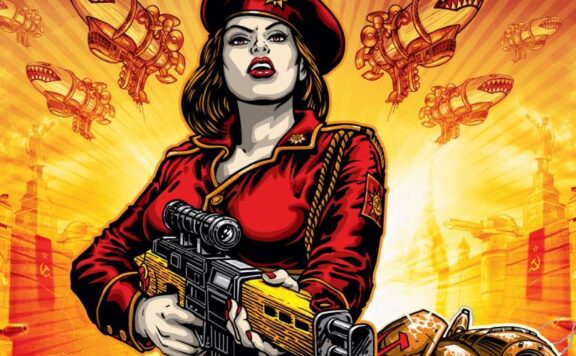In the pantheon of great Sci-Fi classics we tend to remember those created worlds which are most complete and believable. Some movie franchises take years or even decades to fill their universes. Some book series stretch into dozens of titles expanding theirs. Mass Effect is merely two thirds of the way into its trilogy and already has a complete and full universe in which to set its drama.
And drama is what Mass Effect 2 is all about. For the duration of my forty-plus hours with the game so far I have been struggling with how to define it. Is it an action game? An RPG? Is it story-driven or reliant on accomplished game-play to carry it? Is this cinematic or mired in the traditional video-game mechanics? In truth, Mass Effect 2 is all of these things and more. The nearest I can get to an easily-understandable definition is that every aspect of the game, every aspect of the experience, goes towards creating the drama.
The storyline builds from the opening prologue through a series of twists and deceptions to a finale which, by the time you reach it, will be tensely thrilling. It will also, potentially, be tragic or triumphant depending on choices you made throughout the game. You spend much of the play-time building a squad of unlikely cohorts and gaining their loyalty before taking them on an adventure which is always referred to in-game as a “suicide mission”.
The odds are firmly stacked against you and your team from the beginning but there are ways to improve your chances. The complicated looting and upgrading mechanic from the previous Mass Effect have been washed away in favour of a streamlined and simple system.
You spend money earned (or found) during missions on probes and fuel to help you explore the network of solar systems and mine its planets for four different minerals which you then spend on manufacturing upgrades for your weapons and shielding systems. These upgrades apply to the weapons and shields of your entire team too. So once you’ve researched the better targeting system for the assault rifles it is applied to everyone on your squad using assault rifles. There are squad- and class-member specific upgrades too but the system is much easier to navigate and understand than in the previous game.
To start the game you can choose to either import a saved character from a completed play-through of the first game or begin from scratch with a new character. You have the usual selection of gender and physical-appearance customisations to make and then you choose your class. There are three classes based on specialities with combat, tech manipulation or biotics (basically biological manipulation) and three classes which mix the specialities a bit. Each class grows along its own path via the accumulation of experience points (XP) which are handed out at the end of each mission.
That’s the Role Playing aspect of Mass Effect and it can be indulged-in as intricately or as loosely as you wish. You can automatically assign new points to grow your characters without having to think about it if you wish but there is also the potential to tailor your squad so they complement each other’s combat styles and make the unit more powerful on the battlefield.
You might find people extolling the virtues of the storyline and scripting (they’d be right to, it is absolutely wonderful) and you’ll probably see people complain that occasionally the character textures are a little less than perfect (also true, although forgivable given the scale of the game). The voice acting may get praise because it is fantastic when it gels, even if it feels slightly stilted at times due to the sheer number of potential responses that are possible. There will probably be quiet complaints that the mining is slow and tedious and it certainly could have been a bit quicker but I think it adds a layer of effort to the upgrades system – you earn what you gain. What you should hear the most praise for though, is the combat. The area of the first Mass Effect which was in most need of attention has become the area that the sequel positively excels at.
When you’re in the fairly linear combat sequences of the game it plays like any other top-notch third-person cover-based shooter would. Enemies take cover sensibly and, for the most part, they have the intelligence to try to flank you or to change attack patterns in an effort to deprive your squad of a leader. Even the squad-mate AI is reasonable with them taking flanking positions and using their own offensive and defensive powers effectively. You could just play Mass Effect 2 as a shooter and ignore all of the radial-wheel tactical gubbins if you wish.
It is worth getting stuck into the radial combat menus though; they enable you to select your own, and your squad-mates, powers and unleash them tactically to gain the upper hand. The action pauses while you hold down the shoulder button and make your selection. When you release the shoulder button all actions are executed. It can make for some devastating combo attacks.
So, we have an epic over-arching storyline, scripted brilliantly and wrapped around a streamlined RPG mechanic and some action worthy of any top-class shooter. What more could you want? Well, BioWare thinks you might like comprehensive dialogue options (with boy-scout and badass interrupt mechanics for your Paragon or Renegade status which open up further dialogue options) and branching in your storyline which leads to multiple ending possibilities.
It can’t be stressed enough: the choices that you make will affect the direction and outcome of your story. Choose to gain the loyalty of a squad member and it might mean you get everyone out alive. Take one person’s side over another’s in an argument and you might find things getting more difficult later on.
This universe that BioWare have built is complex, diverse and interactive. This is not just you playing a story, this is your story. You change it through virtuous act or nefarious deed and you live with the consequences, not just in one sequence or section of the game. Not even just in one game – your actions will have an effect on Mass Effect 3 too. BioWare’s imagination and mastery of the art of storytelling is unrivalled and they should be complemented in every possible way on what they have pulled off with this game.
Pros:
- Excellent scripting and storyline
- Massive scope and plenty of gameplay
- Tight action and streamlined RPG systems
Cons:
- Occasional minor texture problems on characters
- Dialogue is sometimes stilted due to the range of options available
- Mining operations are slow
Verdict: The scale of this achievement is not to be underestimated. BioWare have built not only an excellent action game or an engrossing RPG. They’ve built a complete experience in another time and space and the complexity and detail which has been poured into this experience is, quite simply, unrivalled by anything in the world of entertainment. There are Hollywood studios, big budget TV companies and global publishing houses who would yearn for the quality of fiction BioWare have crammed into this epic experience. The days of asking when video games will grow up and equal other entertainment forms are over. With Mass Effect 2, BioWare have steered the medium into adulthood.







